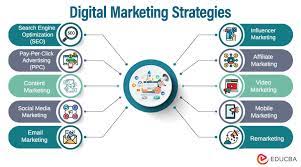The Power of PPC in Digital Marketing
Pay-Per-Click (PPC) advertising is a powerful tool in the world of digital marketing. It offers businesses a cost-effective way to reach their target audience and drive traffic to their websites. In this article, we will explore the benefits of PPC and how it can help businesses achieve their marketing goals.
What is PPC?
PPC is a form of online advertising where advertisers pay a fee each time their ad is clicked. It allows businesses to bid for ad placement in a search engine’s sponsored links when someone searches for a keyword related to their business offering. This model ensures that advertisers only pay when their ad is clicked, making it a cost-effective way to drive targeted traffic to their websites.
The Benefits of PPC
One of the key benefits of PPC is its ability to deliver immediate results. Unlike organic search engine optimization (SEO) that can take time to see results, PPC ads can be set up quickly and start driving traffic to your website almost instantly. This makes it an ideal strategy for businesses looking to increase visibility and generate leads quickly.
PPC also offers precise targeting options, allowing businesses to reach specific demographics, locations, and devices. This level of targeting ensures that your ads are seen by the right audience, increasing the likelihood of conversion and maximizing ROI.
Conclusion
In conclusion, PPC is a powerful tool in digital marketing that offers businesses an effective way to reach their target audience and drive traffic to their websites. With its immediate results, precise targeting options, and cost-effective nature, PPC should be an essential part of any business’s digital marketing strategy.
Top 5 FAQs About PPC Advertising in Digital Marketing
- What is PPC advertising and how does it work?
- What are the benefits of using PPC in digital marketing?
- How do I set up a successful PPC campaign?
- What are some common mistakes to avoid in PPC advertising?
- How can I measure the success of my PPC campaigns?
What is PPC advertising and how does it work?
PPC advertising, short for Pay-Per-Click advertising, is a digital marketing strategy where advertisers pay a fee each time their ad is clicked. It works by allowing businesses to bid on specific keywords relevant to their target audience. When a user searches for those keywords on a search engine, the ads are displayed at the top or bottom of the search results page. Advertisers only pay when someone clicks on their ad, making it a cost-effective way to drive targeted traffic to their websites. PPC advertising offers businesses control over their budget, targeting options, and ad messaging, making it a versatile and efficient tool in digital marketing strategies.
What are the benefits of using PPC in digital marketing?
One of the most frequently asked questions in digital marketing is, “What are the benefits of using PPC?” Pay-Per-Click advertising offers businesses a cost-effective way to reach their target audience and drive traffic to their websites. With immediate results, precise targeting options, and a pay-only-for-performance model, PPC allows businesses to increase visibility, generate leads quickly, and maximize return on investment. It is a powerful tool that can help businesses achieve their marketing goals effectively in today’s competitive online landscape.
How do I set up a successful PPC campaign?
Setting up a successful PPC campaign in digital marketing requires careful planning and execution. To begin, it is essential to conduct thorough keyword research to identify relevant and high-performing keywords for your ads. Creating compelling ad copy that resonates with your target audience is also crucial for attracting clicks. Additionally, setting a clear budget, monitoring performance metrics, and optimizing your campaign based on data analysis are key steps in ensuring success. Regularly testing different ad variations and adjusting your targeting parameters can help improve campaign performance over time. By following these best practices and staying informed of industry trends, you can set up a successful PPC campaign that drives meaningful results for your business.
What are some common mistakes to avoid in PPC advertising?
When it comes to PPC advertising in digital marketing, there are several common mistakes that businesses should avoid to maximize the effectiveness of their campaigns. One common mistake is failing to conduct thorough keyword research, which can result in targeting the wrong audience or bidding on irrelevant keywords. Another mistake is neglecting to optimize landing pages for conversions, leading to high click-through rates but low conversion rates. Additionally, not setting clear goals and tracking key performance metrics can hinder the success of a PPC campaign. It is crucial for businesses to avoid these mistakes and implement best practices to ensure their PPC advertising efforts yield the desired results.
How can I measure the success of my PPC campaigns?
Measuring the success of your PPC campaigns is crucial in determining the effectiveness of your digital marketing efforts. Key performance indicators (KPIs) such as click-through rate (CTR), conversion rate, cost per acquisition (CPA), return on ad spend (ROAS), and overall return on investment (ROI) can help you evaluate the performance of your PPC campaigns. Tracking these metrics over time and analyzing the data will provide insights into what is working well and where improvements can be made to optimize your campaigns for better results. Regular monitoring and adjustment based on performance data are essential to ensuring the success of your PPC campaigns in digital marketing.



